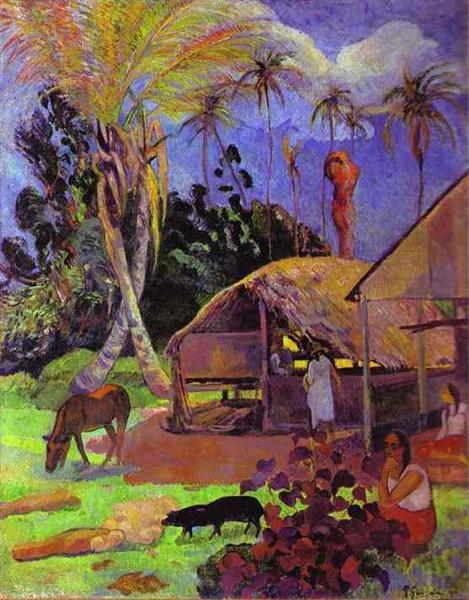Description
Paul Gauguin's "Black Pigs" (1891) is a crucial moment in the evolution of post-impressionist art, where the artist abandons strictly realistic representation to explore deeper symbolism and a vibrant color palette. One of his most recognizable works from the Polynesian period, this painting is emblematic of Gauguin's transition to a style that emphasizes expression over observation.
In the composition, two black pigs dominate the foreground, their dark colour giving them both a majesty and an intriguing singularity. The choice of these animals as protagonists can be seen as a reflection of both daily life in Tahiti, where the artist lived for part of his life, and a search for a more naturalistic and symbolic representation of island life. These pigs appear almost monumental, next to a landscape that is presented in a more abstract way, with colours that are meant to evoke not only the fauna, but also the cultural and spiritual environment of the region.
The use of color is central to Gauguin’s work, and “Black Pigs” is no exception. The palette is characterized by dark, earthy tones that contrast with the lightness of the surrounding areas. The black of the pigs is complemented by muted shades of green and yellow, creating an atmosphere that suggests both tranquility and introspection. This use of color also fits within Gauguin’s tendency to use coloration not only to bring the work to life, but as a means to express emotions and evoke a sense of spirituality.
An interesting aspect of this painting is the way Gauguin incorporates the technique of simplification through lines and shapes, resulting in a composition that challenges conventional proportions and perspectives. This fragmentation of reality is a distinctive feature of his work, and “Black Pigs” stands as a key example in the exploration of this idea. The absence of human figures can be interpreted as a reflection on rural life and its intrinsic connection with nature, a recurring theme in Gauguin’s work.
Throughout his career, Gauguin was interested in depicting elements that transcended the physical, seeking to portray not only what he saw but what he felt and experienced. Black Pigs is among a series of works that have in common their focus on the fauna and flora of Tahiti, inviting the viewer into a visual experience that transcends the literal. This work can also be seen as a bridge to his later work, where symbolism and spirituality are intertwined with the representation of the landscape.
In the context of symbolism and modern art, “Black Pigs” is a testament to his interest in Polynesian culture and his desire to capture its essence. Although some contemporary critics may have misinterpreted it for its apparent simplicity, today we understand that these choices are imbued with a deep reflection on identity, nature and human connection. Paul Gauguin, through this work, continues to be a pioneer who challenges our notions of art, always inviting contemplation and introspection.
KUADROS ©, a famous painting on your wall.
Hand-made oil painting reproductions, with the quality of professional artists and the distinctive seal of KUADROS ©.
Painting reproduction service with satisfaction guarantee. If you are not completely satisfied with the replica of your painting, we will refund 100% of your money.

